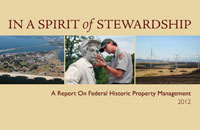2012 Section 3 Report

Executive Summary
This is the third Triennial Report to the President required under Executive Order 13287: “Preserve America,” addressing the state of the federal government’s historic properties and their contribution to local economic development. Issued in 2003, EO 13287 reaffirmed the federal government’s responsibility to show leadership in preserving America’s heritage by “actively advancing the protection, enhancement, and contemporary use of the historic properties owned by the federal government, and by promoting intergovernmental cooperation and partnerships for the preservation and use of historic properties.”
Information in this document came primarily from the progress reports submitted to the Advisory Council on Historic Preservation (ACHP) in September 2011 by real property managing agencies within the executive branch, as well as stewardship meetings with policy and preservation officials committed to the stewardship of these important properties. Agency reports focused on progress made in identifying, protecting, and using historic properties in their ownership. Federal agencies continue to provide creative examples of how they have leased federal historic properties, creatively used others, established public-private partnerships, and supported heritage tourism programs and local economic development.
The ACHP reviewed these Section 3 progress reports to measure the critical progress federal agencies have made in the last three years. The ACHP is pleased to report that 24 agencies submitted reports on or after the September 30, 2011, deadline.
In assessing the progress federal agencies have made over the last three years, the ACHP has made five key findings about the current state of federal historic property stewardship along with recommendations on how agencies can continue to improve their performance in these areas. These findings are summarized as follows:
- While federal agencies and the historic properties under their ownership or control have great potential to create private sector jobs, contribute to the local economy, create public-private partnerships, improve property management practices, and contribute to local and regional heritage tourism initiatives, they have not systematically done so.
- Agencies would benefit from guidance on the advantages of retaining and converting historic buildings and structures into sustainable properties that meet the Administration’s goals for energy efficiency, as well as guidance on promoting the development of a sustainable federal infrastructure that recognizes the economic and environmental value of retaining historic properties.
- Renewable energy initiatives present opportunities for the preservation community to think creatively about resource stewardship and management in the current economic climate but also have the potential to significantly impact historic properties.
- Agencies face a significant challenge in the realignment of real property portfolios, balancing stewardship responsibilities and mission needs.
- Agency strategic plans, which are prepared by senior policymakers to assist in fulfilling the agency’s mission, still frequently do not address historic property management needs or establish goals for improvement at the appropriate level. As a result, many agencies experience conflicts between the National Historic Preservation Act, other statutory requirements, and Administration initiatives.
The recommendations accompanying the findings in Chapter 4 offer a range of actions for the ACHP and its partners to further the current Administration initiatives and policies, goals of EO 13287, and NHPA related to real property management. The ACHP is committed to assisting federal agencies in moving forward with these recommendations so that future actions proposed by the Administration, and agencies themselves, recognize historic properties as important public assets worthy of full consideration in federal property management in a clean energy economy.